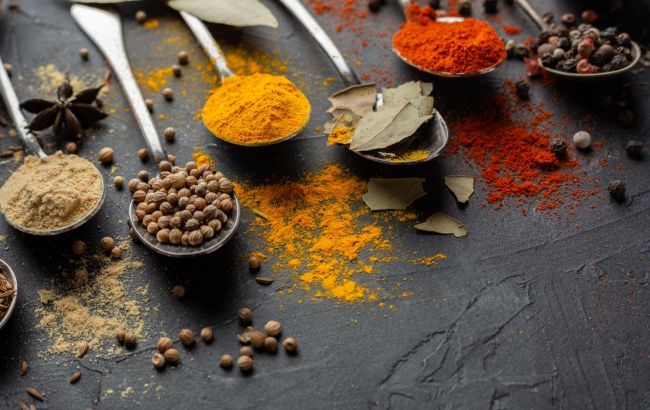11 herbs and spices beneficial for your health
 Herbs and spices beneficial for your health (photo: Freepik)
Herbs and spices beneficial for your health (photo: Freepik)
Herbs and spices are not just flavor enhancers that can transform ordinary dishes into exquisite ones, but they also contain many nutrients that provide a range of health benefits, reports Eat This, Not That.
Turmeric
Turmeric has been used for centuries, with evidence of its demand dating back to the 5th century BC. The main active compound in turmeric, curcumin, helps reduce inflammation. This spice is associated with a reduced risk of cancer, heart disease, type 2 diabetes, and neurological degenerative conditions. These findings are from a 2023 study published in the International Journal of Molecular Sciences.
Turmeric can be added to marinades or used in dry rubs. Always combine turmeric with black pepper or a source of healthy fat to enhance the absorption of curcumin.
Cayenne
Spicy food can boost metabolism and even aid in weight loss. Although research is not conclusive, there is evidence supporting capsaicin's benefits for fat loss. Capsaicin is the main active compound in cayenne pepper. It is also responsible for the anticipated health benefits of this spice.
In a review of studies from 2022 published in the journal Pharmaceuticals, it is claimed that capsaicin can temporarily suppress appetite. Capsaicin can also improve gut microbiota, promoting the growth of bacteria that combat obesity.
This pepper can be added to seafood, meat, popcorn, or marinades.
Basil
Basil helps the body adapt to stress and promotes balance in the body and mind. A 2022 study in Frontiers in Nutrition showed that taking an extract of Holy Basil for two months helped reduce stress levels and improve sleep quality in participants.
Extracts are usually stronger than the plant itself, and more research is needed before concluding basil as a stress relief or sleep aid.
You can add this herb to honey, french fries, and spicy noodle dishes.
Ginger
Ginger contains a wide range of powerful compounds like gingerol that can stimulate stomach emptying and support normal bowel movements.
A 2019 study in Foods showed that ginger's antioxidant and anti-inflammatory properties protect against oxidative stress. According to the study, dried and fried ginger contains more antioxidants than fresh ginger.
Cinnamon
In addition to its anti-inflammatory and antioxidant effects, cinnamon helps control blood sugar levels. It also helps the liver metabolize glucose and can reduce the need for synthetic insulin in individuals with type 2 diabetes.
A 2009 study in the Journal of Medicinal Food shows that cinnamon can also help increase insulin sensitivity and slow down glucose intolerance after a poor night's sleep when blood sugar levels typically spike.
Cinnamon also improves how the brain uses insulin, which can be helpful in certain neurological degenerative conditions like Alzheimer's disease, by controlling high glucose levels in the brain.
You can sprinkle cinnamon on applesauce, baked goods, and add it to drinks.
Oregano
The main components of oregano oil - carvacrol and thymol - help prevent certain viruses from entering the body's cells, providing some support to the immune system. This was shown in a 2020 study published in the Journal of Virology.
Fresh oregano is more aromatic than its dried counterpart and is a great addition to salads, marinades, grilled dishes, and spicy baked goods.
Black Pepper
Black pepper helps the body absorb certain antioxidants better. According to a 2023 report in Aging and Disease, the active compound in black pepper, piperine, helps treat age-related neurological disorders and brain aging.
You can add this spice to almost any dish to give it a distinct flavor.
Rosemary
According to a 2020 study in the Iranian Journal of Basic Medical Sciences, polyphenols, a type of antioxidant in rosemary, help reduce inflammation by slowing down cytokines that control the body's inflammatory response.
Rosemary can be added when cooking steaks to infuse the meat with herbal flavor. It also pairs well with sautéed vegetables and tofu.
Peppermint
Results from a meta-review of controlled clinical trials in 2020 published in Clinical and Translational Science show that peppermint oil helps alleviate symptoms of irritable bowel syndrome (IBS) after 12 weeks of use.
You can add mint to tea or cold summer drinks.
Sage
In a small 2003 study in the journal Pharmacology, Biochemistry, and Behavior, sage was associated with improved memory, particularly immediate recall of words. Researchers found that sage extract helps improve brain function in people with Alzheimer's disease.
You can add sage to fried chicken and steaks, pasta, fried vegetables, and soups.
Garlic
A 2019 study in Trends in Food Science & Technology shows that garlic has antiviral properties that can help support immunity. Sulfur compounds in garlic help boost immunity by stimulating neutrophils, or white blood cells, that fight microbes.
Garlic is a great spice for meat dishes, salads, or toast.
Check out also common foods linked to diabetes risk and 6 food groups that reduce risk of diabetes, cancer and dementia.
This material is for informational purposes only and should not be used for medical diagnosis or self-treatment. Our goal is to provide readers with accurate information about symptoms, causes, and methods of detecting diseases. RBС-Ukraine is not responsible for any diagnoses that readers may make based on materials from the resource. We do not recommend self-treatment and advise consulting a doctor in case of any health concerns.

